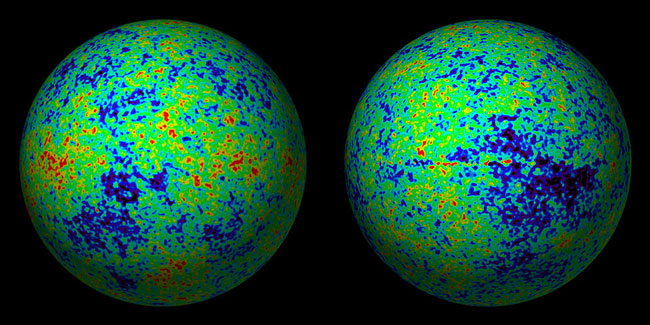Credit & Copyright: WMAP Science Team,
NASA
Explanation:
This year, humanity learned that the universe is
13.7 billion years old.
Before this year, the
universe's age
was thought to be about 13 billion years,
but really only constrained to be between about 12 billion and
15 billion years old.
The difference was made, primarily, by a small satellite named the
Wilkinson Microwave Anisotropy Probe (WMAP)
that had been collecting data in an
unusual Earth orbit.
Pictured above is a sky map of the enabling data -- the complete
cosmic microwave background divided into two hemispheres,
in detail never before resolved, as recorded by the WMAP's
first data release.
Besides universe age, new
data and analyses of the spots
on the
cosmic microwave background bolstered existing indications that the universe
is composed predominantly of a
strange and mysterious type of
dark energy (73 percent).
The remaining matter is only about 4 percent in familiar
atoms,
with the remaining 23 percent in a somewhat mysterious type of
dark matter.
During the year, much cosmological research shifted from
trying to find the
parameters that define our
universe to trying to use these parameters as a tool for understanding
details of how our universe evolved.
1999 2000 2001 2002 2003 2004 2005 2006 2007 2008 2009 2010 2011 2012 2013 2014 2015 2016 2017 2018 2019 2020 2021 2022 2023 2024 2025 |
Yanvar' Fevral' Mart Aprel' Mai Iyun' Iyul' Avgust Sentyabr' Oktyabr' Noyabr' Dekabr' |
NASA Web Site Statements, Warnings, and Disclaimers
NASA Official: Jay Norris. Specific rights apply.
A service of: LHEA at NASA / GSFC
& Michigan Tech. U.
|
Publikacii s klyuchevymi slovami:
WMAP - CMBR - vozrast Vselennoi
Publikacii so slovami: WMAP - CMBR - vozrast Vselennoi | |
Sm. takzhe:
Vse publikacii na tu zhe temu >> | |
